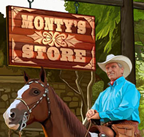Hi there. Five months ago I bought a 10 year old quarter horse gelding for my 4 year old daughter. This is our family's first horse. He's very laid back and is a extremely slow mover (getting him to trot is difficult). Sometimes I think he's asleep while he's walking. They have spent months together in a nearby pasture just walking around getting to know each other. She rides him bareback. About 2 months ago he started refusing to go forward when being led and lipping my hand when I was leading him. He also started to refuse to go forward when mounted. Now the situation has progressed to the point that he doesn't move at all. He just absolutely refuses to budge the moment I snap the lead on him. And if I or my daughter gets on him, he shuffles his feet around for a couple of paces then stops. He's also become less confident…he now stares at every leaf on the ground, eyeing it as though it were a threat. I've asked myself if he's bored. But when we do different things and go to other pastures, he acts like this. He is not willing. And now this "bombproof" horse is suspicious of everything.
I think he started to lose trust in us a while back and I didn't step up to the plate. What can I do to gain his confidence and encourage him to become more a more willing partner? After having read Monty's books and watched countless videos, I think I should do Join-Up with him (which we've not done before) and then start working him with the Dually to get him walking on the lead again. One day I'd like to see my daughter trot on this horse.
I also really want to know how I ended up in this situation. I recently bought 2 more horses and I want to prevent this from happening again…what went wrong? We don't feed him treats and don't always make him "work" when we catch him in his pasture. I'd like to start these relationships on the right foot!




Hi. This problem could come from a number of sources& not necessarily some 'mistake' of yours. Before starting dually head collar training - which in conjunction with Join up is appropriate, I would have a vet check him out ( teeth & back likely problems ) as well as checking out his tack. If this horse is in discomfort he will be unwilling to be co operative. Don't panic! Eliminate each possibility. Once you're certain he has no discomfort or pain you can progress to training but I'm a little concerned by your description of a very lethargic animal of a relatively young age. Perhaps it's not so much well trained but more a medical issue. I'd discuss it thoroughly with a vet. Perhaps a simple blood test could give you the answer but I'm no vet so consult an expert. Good luck. Keep us posted. Cheers, Jo.
Thanks Jo for the feedback...I will start with the vet and then move forward from there!
Hi crimoeller. Like Jo, I am thinking a vet check would be in order before you move on.
I also think you are on the right track with Dually training and Join-Up. :)
.
Mere speculation now on my part on the root to your problems. (This got a bit long, I'm afraid!)
It's my experience that horses will give their new surroundings/circumstances a "honey moon" while they are trying to figure out what they can expect and what is expected from them (primarily to survive), who's in charge and can/does it need to take over. The time frame certainly fits in your story.
.
All this new information coming at them is a very stressful period for many horses as they are a bit "autistic" in their mindset. By that I mean that they have problems dealing with a lot of info at once; they are simply overwhelmed, and
horses generally reacts to this kind of stress either by acting out or closing off.
If this is the case then your horse would be the "closing off" kind.
.
From your words, I am thinking maybe this particular horse looked for a leader and when he didn't find one, his only recourse is to take that upon himself, which would explain why he objects to be led around and acts suspicious of everything.
In that case you need to be very clear and consistent with him; calm and fair, and thinking PICNIC at every turn, every day, every time, so he gets the message.
.
Is your daughter 4 or is it supposed to say 14? I am not questioning your decision at all, but I can't help but think a Quarter horse, no matter how docile, is a bit too big for such a small child to handle. (Not to mention sitting comfortably on.) He definitely has to be confident about his surroundings (humans included) to be a safe mount and good teacher for a 4-year old. I do hope you will get to see them trot together one day! :)
.
Keep in mind now that this is not a "failure" on your part! You are on a learning curve and your horse is trying to tell you something; it's your responsibility to figure out what his needs are and how to meet them. That is what you are now trying to do. :)
As long as you keep that mind set, you will be more confident and calm in your actions, and that will eventually rub off on your horse.
Great advice from Jo and Kicki
Agree with above crimoeller, can I ask had you taught him to lift his back when being ridden?
Mel
Hi there :)
Most of the horses I've worked with start out like this, and many other horses I see around me are on this same path. They're pretty much my specialty :) The most extreme one I've trained would actually tuck his head to his shoulder as soon as you mounted, and not move at all. When I finished with him, he was much happier and would walk and trot on command.
.
Most of the time, I find these horses are created by lack of CONSISTANCY (not yelling at you or anything by capitalizing letters, just trying to emphasize :) For example, I was one day forced to watch one of my friends create a horse like this. She would ask him to turn one way, he would hesitate, suggest they go the other way, and she would sigh and tell him to go the opposite direction instead of consistently asking him to go the way she had wanted in the first place until he did it. He eventually stopped walking for her. (For all pressure, keep the pressure on until they respond the way that you want them to; don't just give in, even if it takes several minutes. Otherwise, you'll confuse them.)
These horses are also created by lack of RELEASE. For example: Girl squeezes horse with her legs; horse walks forwards; girl continues squeezing horse even though he is moving because she wans to go faster; horse gets confused and stops moving; girl gets angry, kicks horse; horse walks forward, but girl keeps kicking; horse stops; horse grows dead to pressure and looks depressed. What should be done instead: Girl squeezes horse with her legs; horse moves forwards; girl stops squeezing and tells horse he is a good boy and lets him walk awhile before asking for an increase in speed; horse understands the lesson and knows now he should move forwards when girl squeezes him with her leg.
(Now, you might not be making either of these mistakes, I'm just telling you this so you know some things that you should not do with this horse.)
.
These horses like it when you reward them lavishly for any small amount of movement- and the reward is stopping all work. For the horse who tucked his head into his shoulder, all we did the first day was pretty much two steps before I got off and congratulated him, ( I should have even untacked him right there). Lots of praise, petting and all that for just those two steps. He was super surprised. He had expected me to change my mind or ask for more and more and more, like everyone else had done. We gradually raised the bar to a few laps of walking around the arena before quitting; then we did a few steps of trotting and walking before quitting, and so on. You probably won't have to be so extreme, this horse was really bad.
.
Now, actually getting to the point of movement, the very first steps, that is the hardest part. I would like to point out that I taught the extreme horse who would not move to back up from the ground before we could achieve anything else, because holding pressure to back up and releasing it is one of the easiest things you can do.
I'd suggest you first work with the dually on the ground and give him lots of praise everytime he listens to you. Even if he barely lifts his hoof and moves it one millimeter you should release pressure for awhile.
.
Next step on his back, (you'll probably have to do this, not the child) get him to take a few steps (or one step) in the direction of your choice. Backing or turning is easier to do at first because you use the reins as your pressure and not your feet so much. As soon as he moves, RELEASE ALL PRESSURE. Very important.
To get forward movement, first squeeze (always USE GENTLE PRESSURE FIRST before adding more pressure, EVERYTIME YOU CUE ANYTHING, this teaches the horse to respond to gentle pressure so you don't have to be rough with them) squeeze, cluck, then slowly start to swing a Giddy-Up rope over his sides (you can make a cheap Giddy-up rope from soft yarn, just make a huge braid with a soft tassled end and a loop on the other, if he doesn't respond, begin to intensify your use of the Giddy-Up rope (faster and harder over his sides, its soft and won't hurt him; with the extreme horse I got so fast I thought my arm was going to snap off), and DO NOT STOP SWINGING UNTIL HE MOVES, at least one step. When he does move, even if its only one step, INSTANTLY RELEASE all pressure and reward him. Don't pull him to a stop right away if he keeps walking, that'll confuse him, but if he decides to stop after a few steps go ahead and let him so that he gets rewarded.
Eventually you build up until you expect him to not slow down or stop in whatever gait you put him in.
So yeah that's pretty much how I train all the horses who won't move and they really appreciate my consistency and praise, and I know I'm doing all right by them because they are always happy to see me and learn to come to me when I call for them in the pasture :) Good luck.
gslmay, I am going to print that post out and hang in my stable as a reminder to myself! :)
Aw, I'm glad you liked it Kicki :) I hope my post helps everyone.
I'd also like to point out that all the slow horses I've worked with, turn out to have the some of the most affectionate and loving personalities of them all, it just has to be revealed by gaining their trust. And I also would like to encourage everyone to never give up on a difficult slow horse because they are definitely worth it. (They are actually my favorite :D )
The extreme horse I was talking about earlier actually did several selfless things for me later, and kept me from getting hurt several times. I was in a dangerous situation in a small pasture once with a new *huge* horse who had absolutely no respect for other horses or people, and came charging down to try and chase my slow horse away, right into where I was standing! My slow horse stopped and blocked me, (he would have run if I hadn't been in the way)and took a beating from the big horse and refused to let the big horse run over me.
That slow horse was the first one I ever trained, and I think I owe it to him that I'm studying this method today.